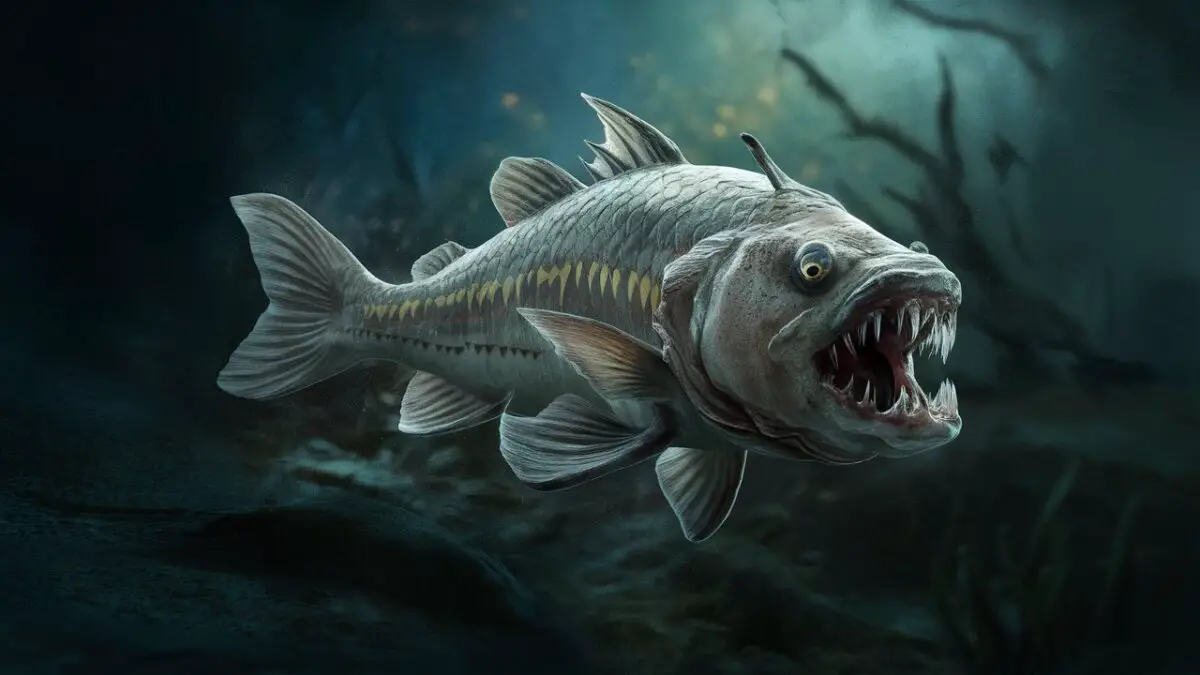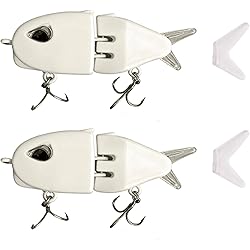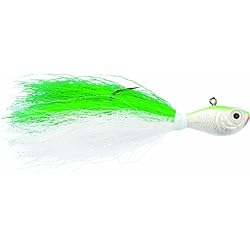The Water Wolf Fish’s Hunting Strategies stand out as a true mystery amidst the numerous secrets the underwater world offers to pique human curiosity.
The name “Water Wolf” is well-deserved for this underwater predator, given its aggressive nature and unusual hunting strategies.
This article explores the ocean’s depths to unravel the hunting techniques used by this amazing animal.
Hoplias malabaricus, the official name for the water wolf fish, has a formidable look thanks to its amazing set of teeth that mimic those of a real predator.
Its ability to hunt effectively is largely dependent on these teeth, which enable it to ambush prey with amazing accuracy.
The Water Wolf uses its acute sense of smell to identify sounds and motion in the water, allowing it to successfully traverse its environment.
Its ability to hunt with stealth and rapid bursts of speed makes it a powerful predator in the aquatic world, and it is one of the most fascinating features of its behavior.
We learn important lessons about the fragile balance of nature under the ocean’s surface as we solve the puzzles of the hunting strategies used by water wolves.
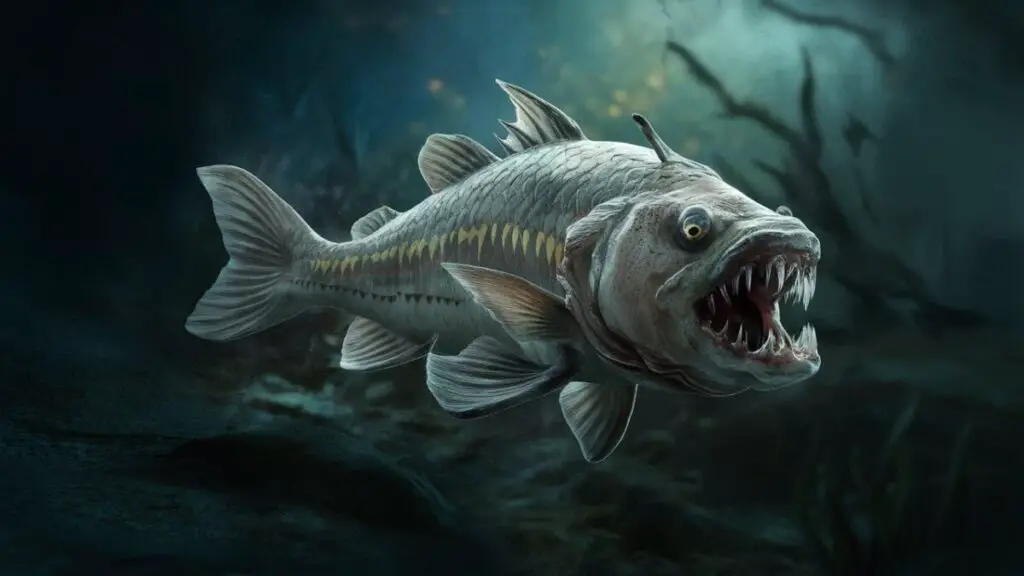
I. Introduction
A. Brief overview of the Water Wolf Fish
Hoplias malabaricus, formerly known as the water wolf fish, is a species of predatory fish found in South America’s freshwater environments.
Its unique look, which is characterized by a streamlined body and razor-sharp teeth, draws interest from both fans and researchers.
The Water Wolf is a fierce hunter who uses ambush and stealth tactics to capture its prey.
This carnivorous animal, with its audacity in complex habitats, is essential to preserving the ecological equilibrium of its environment.
Scientists are further fascinated by the water wolf’s flexibility and tenacity, which motivates continued research to understand its distinct behavioral patterns and ecological significance.
B. Intriguing hunting tactics of Water Wolf Fish
The Water Wolf Fish embodies the complex dance of nature beneath the waves with its audacious reputation for unmatched hunting techniques.
Stealth, speed, and adaptability—three characteristics that set it apart in the underwater domain—are the foundation of its proficiency.
It moves at the speed of an arrow, gracefully traversing the watery expanse and blending in with its surroundings.
Cracking the code on these strategies shows the water wolf fish’s skill and sheds light on the delicate balance that supports the underwater ecology.
This aquatic wonder serves as a tribute to the harmonic intricacy of nature’s intricate network and its strategic brilliance.
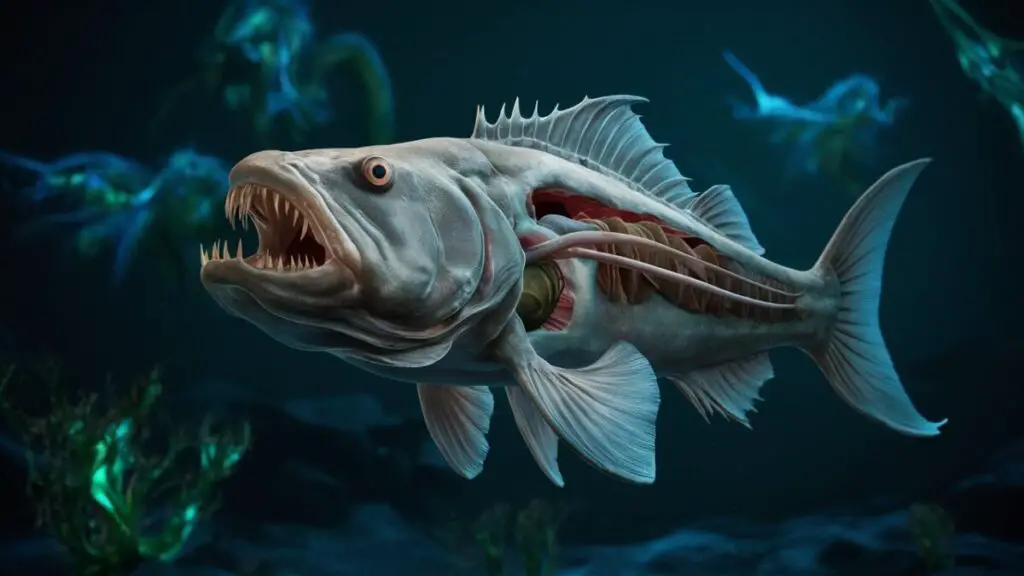
II. Anatomy of the Water Wolf Fish
A. Physical characteristics
The Water Wolf Fish is without a doubt the top predator in its native habitat because of its powerful jaws, bold, sharp teeth, and sleek, streamlined physique.
This amazing species has perfected its evolution, using its physical characteristics to rule the underwater world.
It can quickly catch and subdue prey because of its bold, sharp teeth, and its strong jaws provide a crushing force that makes hunting quick and effective.
These evolutionary adaptations have established the Water Wolf Fish as a master of its environment, maintaining a delicate balance as a predator essential to the health and dynamics of its aquatic ecosystem.
B. Adaptations for underwater hunting
The Water Wolf Fish exhibits an amazing combination of evolutionary prowess and incredible survival methods.
Its unique lateral line system is one of its many adaptations that not only set it apart but are essential to its aquatic supremacy.
With the help of this highly developed sensory system, the Water Wolf Fish is able to traverse its environment with an unmatched level of grace by identifying even the smallest motions and disturbances in the water.
The fish’s increased sensitivity is revolutionary because it allows them to detect prey with startling accuracy.
These adaptations showcase the creativity of nature’s design, making the Water Wolf Fish a formidable predator in the dance of survival.
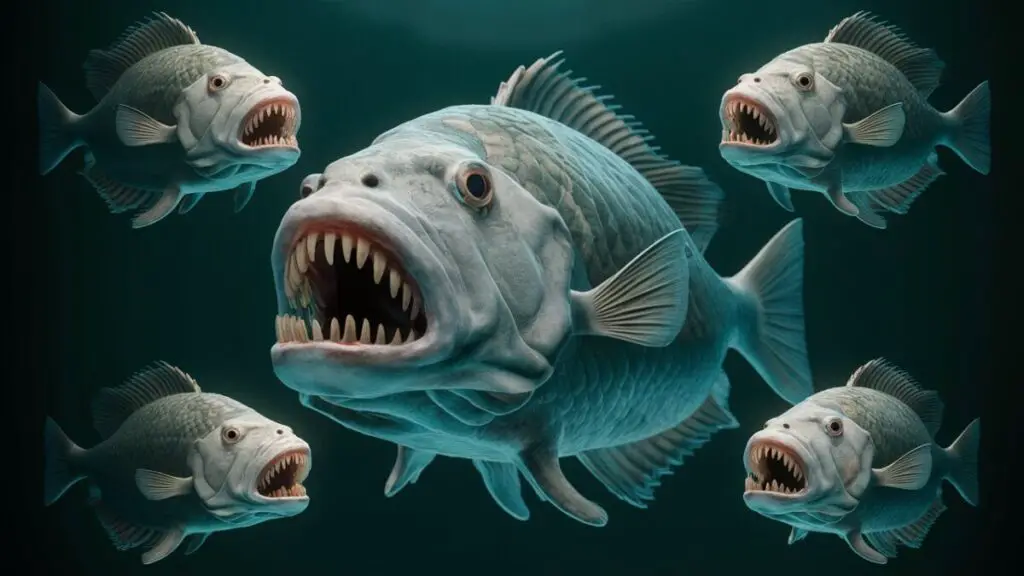
III. Hunting Behavior of Water Wolf Fish
A. Solo hunting vs. pack hunting
The Water Wolf Fish exhibits an amazing combination of evolutionary prowess and incredible survival methods.
Its unique lateral line system is one of its many adaptations that not only set it apart but are essential to its aquatic supremacy.
With the help of this highly developed sensory system, the Water Wolf Fish is able to traverse its environment with an unmatched level of grace by identifying even the smallest motions and disturbances in the water.
The fish’s increased sensitivity is revolutionary because it allows them to detect prey with startling accuracy.
These adaptations showcase the creativity of nature’s design, making the Water Wolf Fish a formidable predator in the dance of survival.
B. Ambush tactics
The Water Wolf Fish has perfected the technique of ambush hunting, using patience and stealth.
These aqueous predators remain still and become almost undetectable to their prey as they blend in with their environment.
They are able to advantage over the element of surprise by waiting patiently and using their intuitive grasp of the surroundings to their advantage.
The Water Wolf Fish is known for its rapid bursts of activity, which are actually well-planned ambushes that surprise unwary victims.
This methodical hunting strategy demonstrates the tactical skill of these aquatic predators, emphasizing their capacity to strike the right balance between immobility and explosive action.
C. Use of camouflage
The Water Wolf Fish, because of its amazing natural camouflage, can blend in with the underwater scenery like an aquatic chameleon.
Not only is this amazing adaptation aesthetically pleasing, but it also plays a vital role in the fish’s hunting strategy.
The water wolf fish imitates its environment, adding an interesting element of surprise to its predatory tactics.
As it navigates the depths, its stealthy presence conceals itself from potential victims until the last minute.
The Water Wolf Fish is a master of underwater deceit because of its unusual blend of stealth and imitation, demonstrating the amazing ways in which nature has endowed species with the ability to survive in their particular settings.
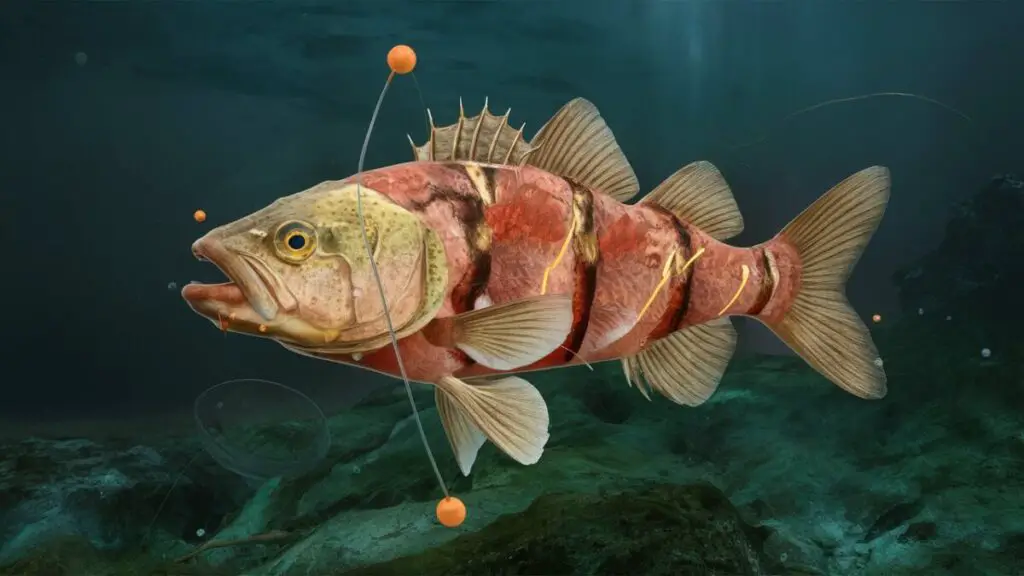
IV. Diet and Prey Preferences of Water Wolf Fish
A. Variety of prey consumed
Wolfwater wolffish, famous for their hunting capacity, have a varied diet and demonstrate remarkable flexibility, which is essential to their success.
Skillfully navigating a variety of aquatic environments, these fierce predators boldly prey on smaller fish, crabs, and even amphibians.
They move quickly, taking advantage of the element of surprise to capture a plentiful meal as part of their predatory strategy.
Interestingly, this adaptation increases their resistance to constantly changing settings while simultaneously expanding their food sources.
The Water Wolf Fish’s ability to move between different types of food with ease highlights their ecological relevance, establishing them as adaptable and dominant predators within the complex web of aquatic life.
B. Unique hunting strategies for different prey types
The hunting techniques employed by Water Wolf Fish vary depending on the type of prey.
From swift pursuits for smaller fish to strategic stalking for larger targets, each approach is finely tuned to the characteristics of the prey.
Easy-to-Use 5-inch Color Fishfinder and Sonar Transducer
When pursuing smaller fish, the Water Wolf Fish relies on its remarkable speed and agility, swiftly navigating through the water with precision.
However, when targeting larger prey, the fish adopts a more patient strategy, utilizing its keen senses to stealthily stalk its quarry before launching a calculated strike.
This adaptability showcases the Water Wolf Fish’s remarkable ability to adjust its hunting tactics based on the size and behavior of its chosen prey.
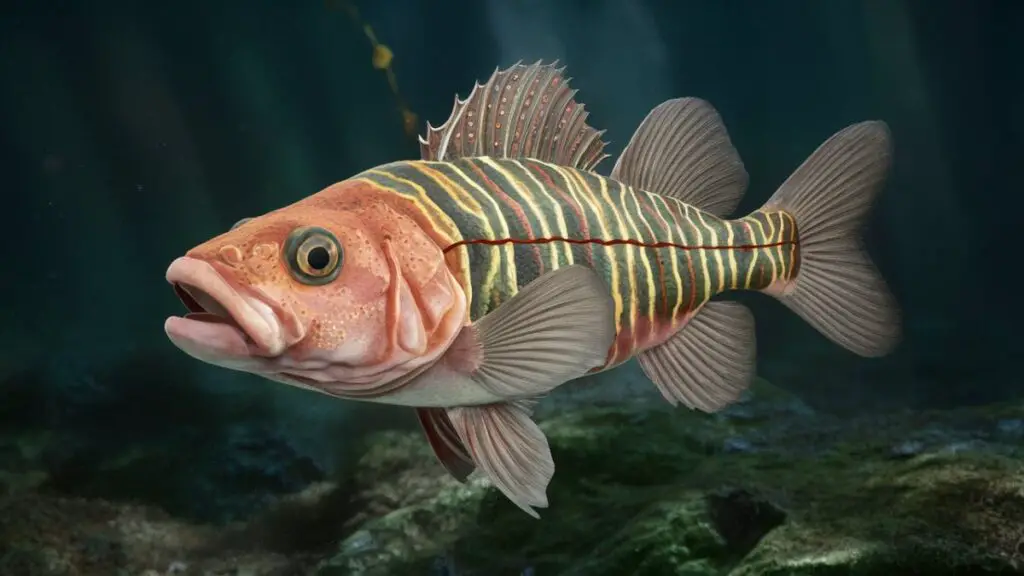
V. Sensory Abilities of Water Wolf Fish
A. Exceptional vision in low light
The capacity to see in low light is one of the Water Wolf Fish’s unique traits, which gives it a clear edge during dawn and dusk hunts.
Its huge, specialized eyes, which have a high number of rod cells and increase sensitivity to low light levels, enable this amazing adaptation.
Because of their ability to detect even the smallest glimmers, water wolf fish are able to navigate murky waters with an incredible level of accuracy.
Once the sun sets, this special eyesight turns into a powerful tool that allows fish to hunt prey covertly and strike with amazing precision in the dark water.
B. Lateral line system for detecting prey movements
A miracle of biology, the lateral line system is a magnificent network of sensitive sensors that runs the length of the fish’s body.
Thanks to its well-calibrated sensors, the fish has an unmatched capacity to sense even the smallest movements in the water.
This enhanced sensory awareness is a survival benefit rather than just an evolutionary adaptation.
The fish uses its biological radar to locate prey, quickly focusing on small perturbations and navigating its watery surroundings with remarkable accuracy.
Underneath the surface, a complex dance between predator and prey demonstrates how important the lateral line system is to a fish’s search for food.
The Water Wolf Fish’s Hunting Strategies
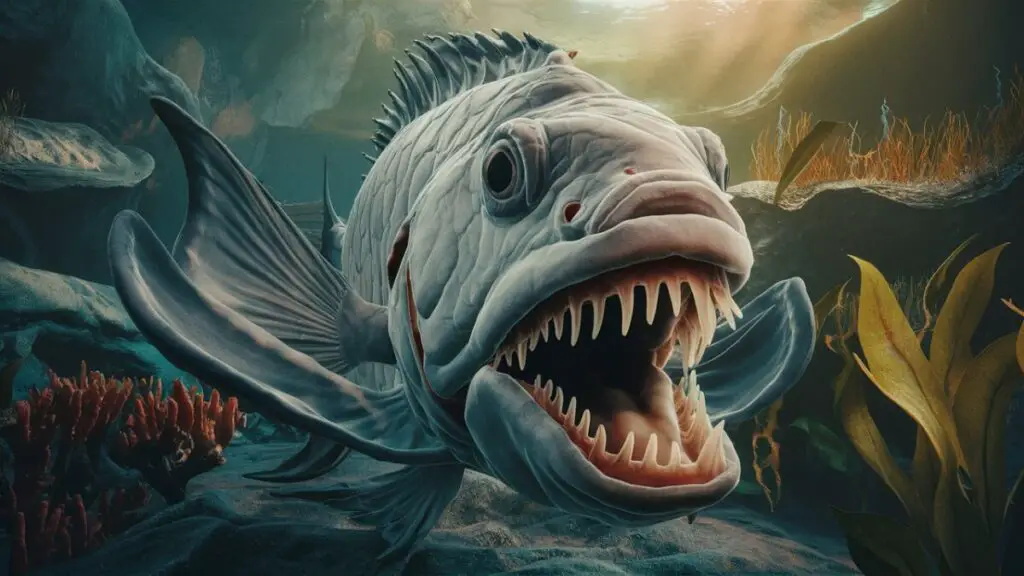
VI. Impact on Ecosystem of Water Wolf Fish
A. Role in maintaining balance
Wolf of the Water Interpreting the Water Wolf’s Hunting Strategies Fish, also called Hoplias malabaricus, are essential apex predators in aquatic environments because of their exceptional hunting skills.
Their clever hunting methods and ravenous hunger help keep the population of lesser fish under control, preventing overcrowding that may upset the delicate ecological balance.
Within this mutualistic relationship between predator and prey, water wolf fish play a vital role in maintaining the integrity of the ecosystem.
Easy-to-Use 5-inch Color Fishfinder and Sonar Transducer
By regulating the population dynamics, they foster biodiversity, ensuring harmonious coexistence among the various species inhabiting their watery domain.
As guardians of balance, Water Wolf Fish exemplify the intricate interconnectedness within their habitat, showcasing nature’s finely tuned equilibrium.
B. Influence on other aquatic species
The interactions between the water wolf fish and other aquatic species highlight the extensive web of links found throughout underwater ecosystems.
Water wolf fish, as apex predators, are critical to preserving aquatic life’s delicate balance.
Predatory behavior shapes the distribution and behavior of prey species, which in turn shapes the total biodiversity.
Comprehending these processes is crucial for biodiversity conservation because it allows scientists and conservationists to create practical plans.
Understanding the intricate interactions between the water wolf fish and other underwater life can help us make critical decisions about conservation and ensure the long-term viability of aquatic ecosystems.
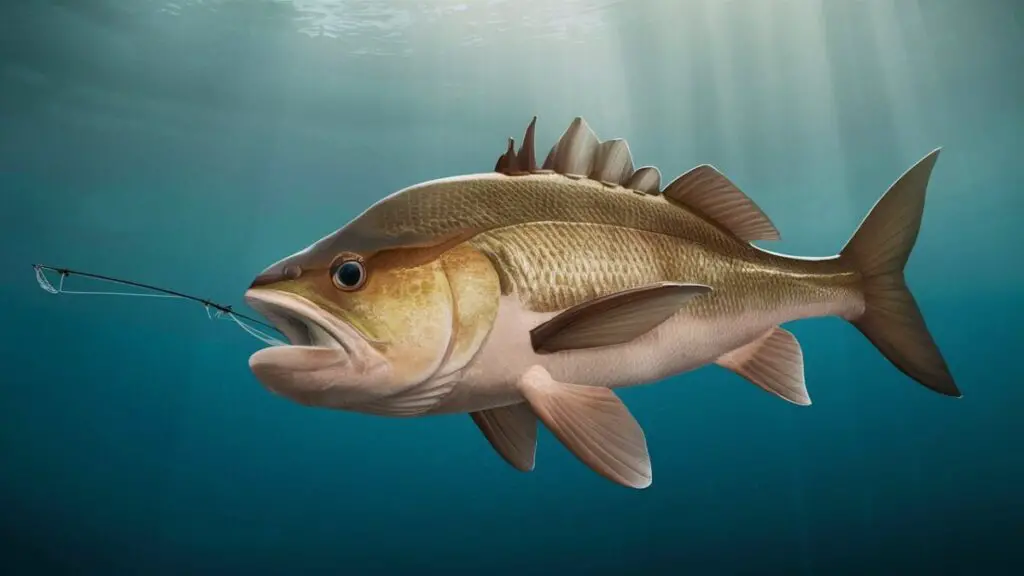
VII. Conservation Concerns of Water Wolf Fish
A. Human impact on Water Wolf Fish habitats
The growing human footprint, which is characterized by pollution and habitat degradation, seriously threatens the population of water wolf fish.
Industrial activity and rapid urbanization are degrading aquatic environments, which directly affects the species.
Conservation efforts must immediately address these issues, taking steps to reduce habitat loss and manage pollution.
It is important to include local populations in sustainable practices and increase public understanding of the water wolf fish’s ecological significance.
We can protect the species and its environment by encouraging a sense of shared responsibility for conservation, which will guarantee the survival of this rare and delicate aquatic organism for future generations.
B. Efforts to protect and conserve the species
The preservation of the water wolf fish depends on conservation efforts, which include anything from public awareness campaigns to habitat restoration.
Long-term success depends on cooperative efforts between local communities and conservation groups.
Comprehensive restoration initiatives should incorporate sustainable resource management and pollution control to improve habitat preservation.
Lowrance Hook Reveal 9 inch Fishfinders with Preloaded C-MAP Options
By involving communities in educational initiatives, one can foster a sense of accountability and encourage the adoption of environmentally beneficial behaviors.
Moreover, conservation initiatives can have a greater impact if government agencies and non-governmental organizations collaborate.
By combining scientific knowledge with community engagement, we can build a strong defense for the water wolf fish and its habitat, ensuring a healthy balance for future generations.
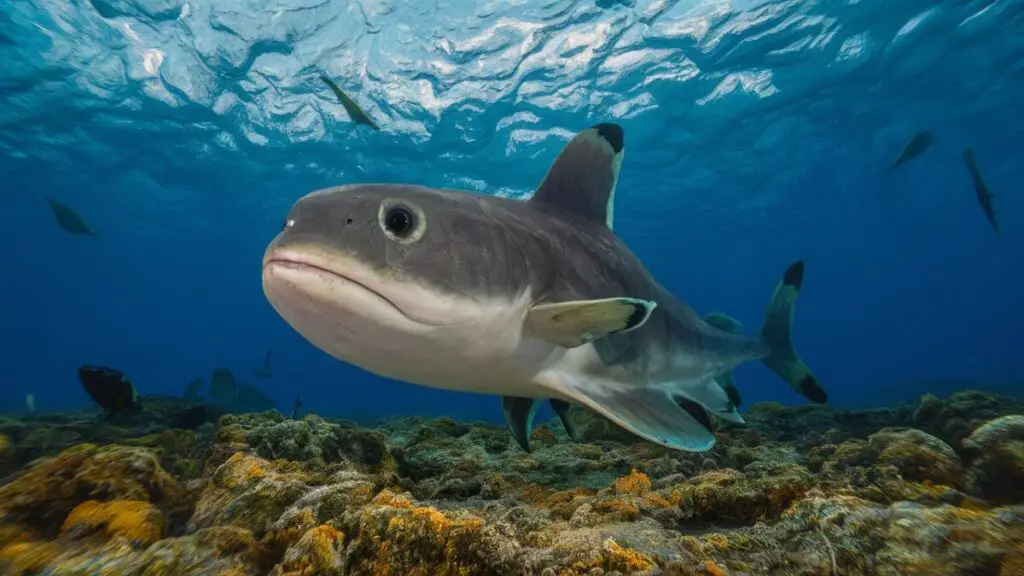
VIII. Water Wolf Fish Interactions with Humans
A. Folklore and cultural significance
The Water Wolf Fish is a magnificent and mysterious fish that is significant to the local cultures in which it lives.
Not only does it influence the water, but it also infuses traditional tales and mythology in the area, symbolizing adaptation and resiliency.
Understanding this mysterious species’ cultural background reveals a complex web of values and ideas woven together over many generations.
The Water Wolf Fish has a life beyond its biological identity, from representing the tides in coastal villages to acting as a guardian spirit in native myths.
Lowrance Hook Reveal 9 inch Fishfinders with Preloaded C-MAP Options
This cultural lens adds depth to our appreciation, transforming the fish from a biological wonder into a living embodiment of cultural heritage.
B. Challenges faced by fishermen
Despite the Water Wolf Fish’s symbolic value in some cultural contexts, its existence presents challenges for local fishermen.
Striking a balance between the species’ conservation needs and the fishing-dependent populations’ means of subsistence requires careful management techniques.
Collaboration between local stakeholders, lawmakers, and environmentalists is necessary to achieve this balance.
We can lessen the effects on the population of water wolf fish by implementing sustainable fishing methods, such as controlled catch limits and habitat protection zones.
Furthermore, encouraging aquaculture or eco-tourism as alternative sources of income for fishermen builds community resilience.
In the end, a comprehensive strategy is necessary to guarantee both the wealth of the nearby fishing villages and the coexistence of this treasured species.

IX. Water Wolf Fish Research and Discoveries
A. Recent findings about Water Wolf Fish behavior
Further investigation is revealing new aspects of the behavior of water wolf fish.
Recent findings aid our growing understanding of this species and its function in aquatic habitats.
A central theme has been the complex dynamics of their social structure and communication systems.
Once thought to be solitary animals, water wolf fish are now shown using cooperative hunting techniques, which contradicts earlier beliefs.
Additionally, as experts examine their ecological impact, the impact they have on local biodiversity is becoming more apparent.
These findings emphasize the importance of protecting habitats that support the growth of water wolf fish, as well as the need for conservation initiatives to preserve the delicate balance of aquatic ecosystems.
B. Ongoing research projects
Researchers worldwide are engaged in projects aimed at further unraveling the mysteries of the Water Wolf Fish.
Collaborative efforts ensure a comprehensive exploration of its behavior, physiology, and ecological impact.
Through cutting-edge technology and interdisciplinary studies, scientists delve into the intricate aspects of the Water Wolf Fish’s habitat preferences and migration patterns.
Lowrance HOOK Reveal 5 Inch Fish Finders with Transducer
By employing advanced tracking devices, researchers gain insights into its movements, shedding light on the species’ role in maintaining aquatic ecosystems.
These findings contribute to conservation strategies, as understanding the Water Wolf Fish’s ecological impact is crucial for preserving biodiversity and ensuring the sustainable management of freshwater environments on a global scale.
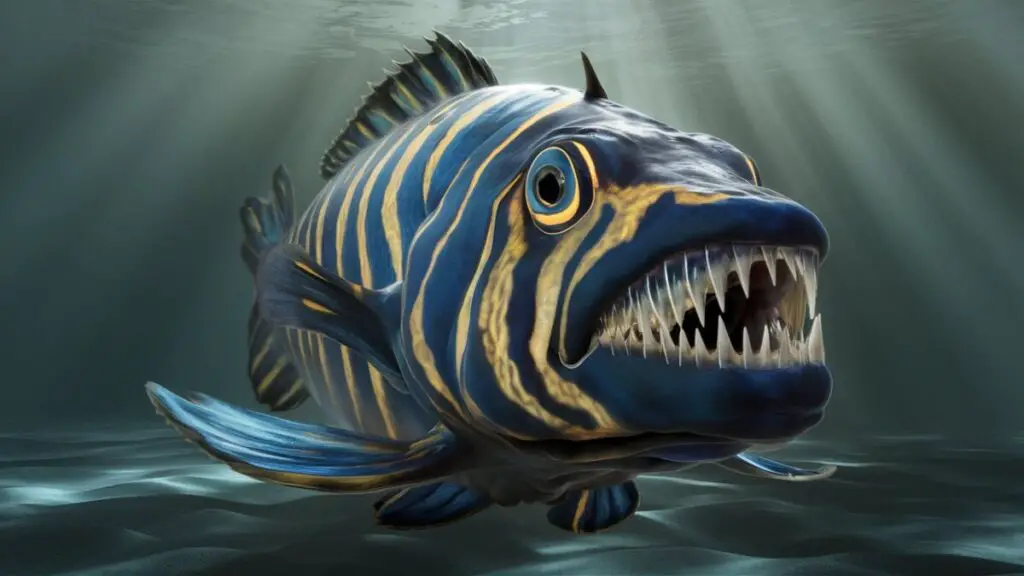
X. Threats to Water Wolf Fish Population
A. Pollution and habitat destruction
There are significant hazards to the population of water wolf fish due to human-induced concerns such as pollution and habitat degradation.
It is essential for the speciessurvival to mitigate these dangers.
The main priorities should be creating protected areas, encouraging sustainable fishing methods, and enforcing strict environmental laws to reduce pollution.
Education and awareness initiatives should raise community awareness of the need to protect the water wolf fish and its ecology.
Local communities, conservation organizations, and governments must collaborate to effectively address these challenges.
By prioritizing conservation measures, we can protect the water wolf fish and contribute to preserving the delicate balance of aquatic habitats.
B. Climate change effects
The effects of climate change, which include changes in water currents and temperature swings, directly affect the Water Wolf Fish and its environment.
Shifting water currents alter the availability of food and breeding conditions, while rising temperatures disrupt the delicate balance essential to the species’ survival.
If conservation efforts must recognize and address these consequences if they are to protect the water wolf fish and its ecology.
Mitigating the negative effects becomes dependent on putting adaptive techniques into practice, such as creating protected zones and encouraging sustainable fishing methods.
The Water Wolf Fish is facing an uncertain future in the absence of aggressive steps, underscoring the need for comprehensive conservation efforts.
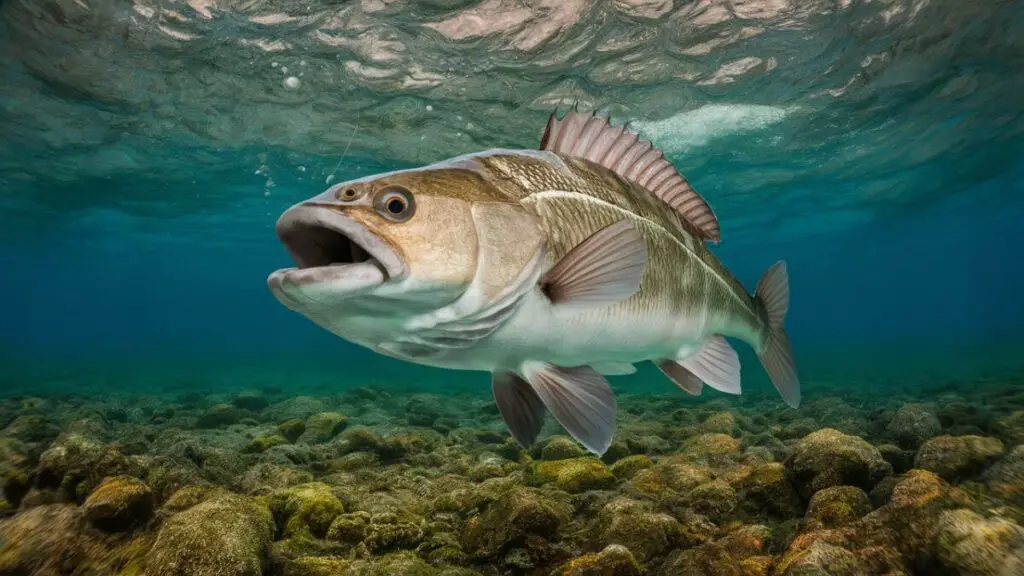
XI. Future Prospects of Water Wolf Fish
A. Importance of conservation efforts
The Water Wolf Fish’s survival depends on committed conservation efforts.
To ensure this apex predator has a healthy future, protecting its habitat and increasing public knowledge of the species are crucial.
Leading these projects calls for cooperation between local communities, legislators, and scientists.
To maintain the water wolf’s habitat, it is critical to establish protected areas and enforce ethical fishing methods.
Educational initiatives that make use of contemporary media and community involvement are essential for promoting compassion and understanding.
We can all do our part to ensure that the water wolf fish and its habitat continue to thrive in the long run by highlighting the value of coexistence and ecological balance.
B. Potential for sustainable management
The implementation of sustainable management methods, informed by scientific research and community engagement, is necessary to achieve a balance between the demands of human populations and water wolf fish.
By implementing ecologically appropriate measures, we can maintain the local population’s standard of living while also protecting the fragile aquatic ecology.
Collaborative projects give communities the ability to take an active role in conservation efforts, which cultivates a sense of accountability.
The basis for well-informed decision-making is scientific study, which enables us to comprehend the dynamics of the environment and population of water wolf fish.
Lowrance HOOK Reveal 5 Inch Fish Finders with Transducer
In this holistic approach, sustainable practices become a bridge between environmental preservation and human prosperity, creating a harmonious coexistence for both species.
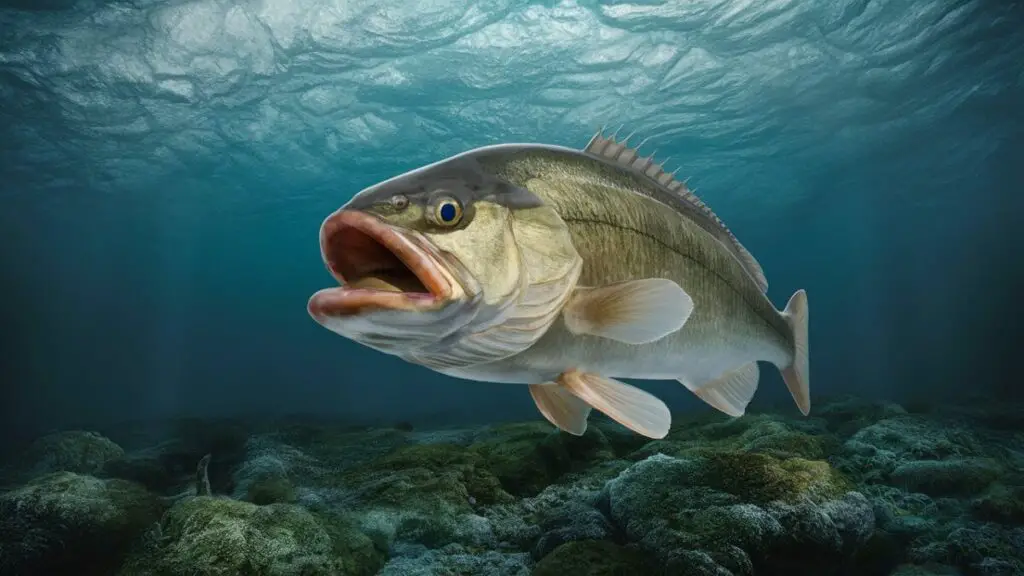
XII. Conclusion
A. Recap of Water Wolf Fish hunting tactics
The Water Wolf Fish, a master of underwater predatory tactics, reveals the wonders of nature’s inventiveness via its use of stealth, ambush, and adaptation.
It embodies the delicate equilibrium seen in aquatic ecosystems as it moves across underwater worlds with a beautiful combination of various tactics.
Its deliberate movements provide a deep understanding of the complex network of life below the surface.
Comprehending the ways in which this strong predator maneuvers through its surroundings highlights the need to preserve harmony in our aquatic ecosystems and illuminates the interdependent links between species.
By adopting the Water Wolf Fish’s core strategies, we can learn important lessons about the coexistence of many aquatic organisms.
B. Emphasis on the need for conservation
Uncovering the Water Wolf Fish’s hunting strategies reveals the value of conservation.
Examining its ability to track prey and navigate a variety of watery conditions reveals the complex balance that exists among ecosystems.
Preserving the water wolf fish represents a deep commitment to maintaining the health and balance of entire ecosystems, and it’s not just about protecting species.
By preserving this top predator, we contribute to the maintenance of complex food chains and ecological balance that goes well beyond the boundaries of this amazing species.
Thus, conservation efforts go beyond individual preservation and become a comprehensive commitment to the health of the planet’s interdependent living forms.
XIII. FAQs
A. What is the water wolf fish?
The Water Wolf Fish, scientifically known as Hoplias malabaricus, is a predatory fish species found in South American freshwater habitats.
B. How do water wolf fish hunt in packs?
Water wolf Fish exhibit both solo and pack hunting behaviors, adapting their strategies based on the availability and size of prey.
C. Why is the species considered a “Water Wolf”?
The Water Wolf Fish earned its moniker due to its fierce demeanor, unique hunting tactics, and apex predator status in aquatic ecosystems.
D. What is the impact of water wolf fish on local ecosystems?
Water wolf fish play a crucial role in maintaining ecological balance by regulating the population of smaller species and preventing overpopulation.
E. Are there any efforts to protect the water wolf fish?
Yes, conservation initiatives, including habitat restoration and public awareness campaigns, are underway to protect and conserve the water wolf fish.
Hooked on Tech: Exploring the latest Fishing Gadgets that Anglers swear by.
In the realm of angling, where tradition and technology often converge, a new wave of fishing gadgets has emerged, transforming the way anglers approach their craft.
From advanced fish finders to smart bait systems, these innovations have not only revolutionized the fishing experience but have also garnered a loyal following among anglers worldwide.
HERCULES Braided Fishing Line 12 Strands, 100-2000m 109-2196 Yards Braid Fish Line, 10lbs-420lbs Test PE Lines for Saltwater Freshwater
$13.99 (as of November 17, 2025 04:55 GMT +00:00 – More infoProduct prices and availability are accurate as of the date/time indicated and are subject to change. Any price and availability information displayed on [relevant Amazon Site(s), as applicable] at the time of purchase will apply to the purchase of this product.)YAFIYGI Skin Tag Rubber Band 2X Pellet Bander Tool Set Micro Bait Bands for Fishing Terminal Tackle with 100 Bands, Match Coarse Fishing Accessories Kit
$7.88 (as of November 17, 2025 10:19 GMT +00:00 – More infoProduct prices and availability are accurate as of the date/time indicated and are subject to change. Any price and availability information displayed on [relevant Amazon Site(s), as applicable] at the time of purchase will apply to the purchase of this product.)AOFUXTI Fishing Tool Kit – Fishing Pliers, Hook Remover, Fish Gripper,Fish Scale, Fish Knife, Saltwater Fishing Gear with Sharpeners, Best Gifts for Men
$16.58 (as of November 16, 2025 22:22 GMT +00:00 – More infoProduct prices and availability are accurate as of the date/time indicated and are subject to change. Any price and availability information displayed on [relevant Amazon Site(s), as applicable] at the time of purchase will apply to the purchase of this product.)SHALL Fishing Tool Kit, Corrosion Resistant Fishing Gear and Equipment – Fishing Pliers, Fillet Knife, Fishing Scissors, Fish Lip Gripper, Fish Ruler, Lanyard, Premium Fishing Tools for Men
$18.99 (as of November 17, 2025 16:21 GMT +00:00 – More infoProduct prices and availability are accurate as of the date/time indicated and are subject to change. Any price and availability information displayed on [relevant Amazon Site(s), as applicable] at the time of purchase will apply to the purchase of this product.)PLUSINNO Fishing Backpack with Tackle Boxes, Waterproof Fishing Sling Tackle Bag For Fishing Gear With Rod Holder, Fishing Gifts for Men With Fishing lures, Fishing pliers, Fish Lip Gripper.
$38.99 (as of November 17, 2025 04:55 GMT +00:00 – More infoProduct prices and availability are accurate as of the date/time indicated and are subject to change. Any price and availability information displayed on [relevant Amazon Site(s), as applicable] at the time of purchase will apply to the purchase of this product.)Fishing Pliers, Fishing Gear, Fish Control, Multi-purpose Fishing Pliers, Firm Lip Grabber, Stainless Steel and Anti-corrosion Coating, Fishing Accessories, Sheath Storage, Fishing Gifts for Men
$13.89 (as of November 17, 2025 01:04 GMT +00:00 – More infoProduct prices and availability are accurate as of the date/time indicated and are subject to change. Any price and availability information displayed on [relevant Amazon Site(s), as applicable] at the time of purchase will apply to the purchase of this product.)AJHMGJGO 2Pcs Mini Glide Bait for Bass Fishing,Slow Sinking Raptor Fishing Lure,Freshwater Saltwater Multi Jointed Swimbait Wobbler,for Amazing Fishing Gear Gifts for Family
$9.89 (as of November 16, 2025 22:22 GMT +00:00 – More infoProduct prices and availability are accurate as of the date/time indicated and are subject to change. Any price and availability information displayed on [relevant Amazon Site(s), as applicable] at the time of purchase will apply to the purchase of this product.)Fishing Landing Net with Telescoping Pole Handle, Fishing net Freshwater for Men and Women, Extend to 40-63 Inches
Now retrieving the price.
(as of November 16, 2025 22:22 GMT +00:00 – More infoProduct prices and availability are accurate as of the date/time indicated and are subject to change. Any price and availability information displayed on [relevant Amazon Site(s), as applicable] at the time of purchase will apply to the purchase of this product.)Goture Fishing Pliers Set with 420 Stainless Steel, Titanium Coated, Line Cutter- Split Ring and Hook Remover, Needle Nose Pliers, Fishing Gear Kit
Now retrieving the price.
(as of November 16, 2025 02:12 GMT +00:00 – More infoProduct prices and availability are accurate as of the date/time indicated and are subject to change. Any price and availability information displayed on [relevant Amazon Site(s), as applicable] at the time of purchase will apply to the purchase of this product.)Clear Fishing Wire, Acejoz 656FT Fishing Line Clear Invisible Hanging Wire Strong Nylon String Supports 40 Pounds for Balloon Garland Hanging Decorations
$5.99 (as of November 17, 2025 04:55 GMT +00:00 – More infoProduct prices and availability are accurate as of the date/time indicated and are subject to change. Any price and availability information displayed on [relevant Amazon Site(s), as applicable] at the time of purchase will apply to the purchase of this product.)Movtovic 70 Pcs Corrosion Resistance Fishing Swivels & Snaps, 7 Sizes Detachable Snap Swivels, Convenience Pack Swivels Fishing Tackle for Recreational Fishing
$3.99 (as of November 16, 2025 22:22 GMT +00:00 – More infoProduct prices and availability are accurate as of the date/time indicated and are subject to change. Any price and availability information displayed on [relevant Amazon Site(s), as applicable] at the time of purchase will apply to the purchase of this product.)Spro Bucktail Jig-Pack of 1
$7.99 (as of November 17, 2025 04:55 GMT +00:00 – More infoProduct prices and availability are accurate as of the date/time indicated and are subject to change. Any price and availability information displayed on [relevant Amazon Site(s), as applicable] at the time of purchase will apply to the purchase of this product.)FONMANG Fishing Lures – 2025 New Tackle Box with Tackle Included, Fishing Kit with VIBs, Frogs, Minnows, Soft Baits, Hooks & Weights Accessories, Freshwater Lure Kit for Bass Walleye Trout
$11.99 (as of November 16, 2025 04:06 GMT +00:00 – More infoProduct prices and availability are accurate as of the date/time indicated and are subject to change. Any price and availability information displayed on [relevant Amazon Site(s), as applicable] at the time of purchase will apply to the purchase of this product.)Eupheng Sheepshead Jigs, Standup Style Saltwater Fishing Jigheads, 1/2oz 3/4oz 1oz 1.5oz & 2oz with 2X Strengthened Hooks for Blackfish (Tautog), Grouper & Snapper
Now retrieving the price.
(as of November 17, 2025 06:42 GMT +00:00 – More infoProduct prices and availability are accurate as of the date/time indicated and are subject to change. Any price and availability information displayed on [relevant Amazon Site(s), as applicable] at the time of purchase will apply to the purchase of this product.)RUNCL ProBite Lipless Crankbait, Vibe Cranks 1/4oz 3/8oz 1/2oz 5/8oz, Hard Fishing Lures – Lifelike Design, Loud Rattles, Precise Weighting System, Tight Wobble Action
Now retrieving the price.
(as of November 16, 2025 22:22 GMT +00:00 – More infoProduct prices and availability are accurate as of the date/time indicated and are subject to change. Any price and availability information displayed on [relevant Amazon Site(s), as applicable] at the time of purchase will apply to the purchase of this product.)
